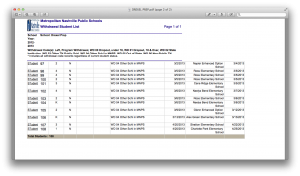We had the pleasure to interview Speaker Beth Harwell again.
1) You have been quoted as saying that districts might need more time to absorb current reform before a voucher plan is enacted. Do you support the adoption of a voucher plan in this legislative session?
I think we need to be mindful about the changes we have already made, and certainly ensure any changes can be as seamless as possible. Most of the proposals that have been brought forth are limited in some way, so I think there is a desire to ease into it.
2) If a voucher program is implemented, would you consider independent funding of the voucher students, i.e. funding their tuition through new state funding rather than by redirecting BEP and local funds that would have gone to the LEA? If the voucher program is limited, as Governor Haslam would like, this could be a relatively inexpensive way to test whether vouchers can raise student achievement without penalizing LEAs for the experiment.
I want everyone’s voice to be heard throughout the process, and welcome all ideas. However, we are already anticipating a tight budget due to revenue shortfalls, so a new funding source may not be possible at this time.
3) Under Republican leadership, Tennessee expanded access to charter schools beyond the original limitations based on students eligible for free and reduced-price lunch, as well as those in currently failing schools. Currently, access to pre-kindergarten is limited along similar lines, with free and reduced-price lunch students eligible first, and others eligible if there is enough space. Why not follow the same path as charter schools, and make pre-K available for more students?
I believe we should keep Pre-K funding in place for those at-risk children that are currently eligible for the program. I am not for an expansion, however, because I think our focus right now needs to be on K-12 and making sure those public schools have the resources they need at their disposal. If there is additional money available, I would like to see it go to remedial programs in our K-12 schools.
4) There has been some recent discussion from MNPS and other districts about the state needing to fix the BEP. Perhaps along the lines of the reform started under BEP 2.0. Do you support moving forward with new BEP investment at this time?
The Governor just announced this week that he has formed a task force to take a hard look at the BEP funding formula, including the changes that were made with BEP 2.0. I applaud that approach, because even BEP 2.0 was passed seven years ago. I think allowing the stakeholders come to the table and have a serious discussion about the future of the BEP and what, if any, changes need to be made is important.
5) Some groups have called for the suspension of the use of TVAAS data in teacher evaluations until PARCC is fully implemented. Would you support this?
There are bills that have been proposed this year to take a look at a delay. While my personal preference is not to suspend or delay the use of this data, I will let the legislative process work and a full and healthy debate happen. I understand the concerns, and I’m listening, but I believe it is very important to use the data we are collecting to ensure Tennessee students are getting the education they deserve.
6) TNEdReport interviewed you last June, what has changed in the educational landscape of Tennessee since then?
I don’t know that much has changed, but there has been a lot of healthy discussion on the direction of education in Tennessee, and I think that is a positive thing.
7) What do you tell the teachers who are upset with the constant changes in education policy in Tennessee?
I value the work our teachers do, and I am pleased the Governor has committed to make Tennessee’s teacher salaries the fastest growing in the nation. They deserve that recognition and compensation. We share the same goal: to see that every child in Tennessee has the opportunity to succeed.





